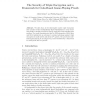Free Online Productivity Tools
i2Speak
i2Symbol
i2OCR
iTex2Img
iWeb2Print
iWeb2Shot
i2Type
iPdf2Split
iPdf2Merge
i2Bopomofo
i2Arabic
i2Style
i2Image
i2PDF
iLatex2Rtf
Sci2ools
120
click to vote
EUROCRYPT
2006
Springer
2006
Springer
The Security of Triple Encryption and a Framework for Code-Based Game-Playing Proofs
We show that, in the ideal-cipher model, triple encryption (the cascade of three independently-keyed blockciphers) is more secure than single or double encryption, thereby resolving a long-standing open problem. Our result demonstrates that for DES parameters (56-bit keys and 64-bit plaintexts) an adversary's maximal advantage against triple encryption is small until it asks about 278 queries. Our proof uses codebased game-playing in an integral way, and is facilitated by a framework for such proofs that we provide.
Adversary's Maximal Advantage | Cryptology | EUROCRYPT 2006 | Long-standing Open Problem | Triple Encryption |
| Added | 22 Aug 2010 |
| Updated | 22 Aug 2010 |
| Type | Conference |
| Year | 2006 |
| Where | EUROCRYPT |
| Authors | Mihir Bellare, Phillip Rogaway |
Comments (0)

